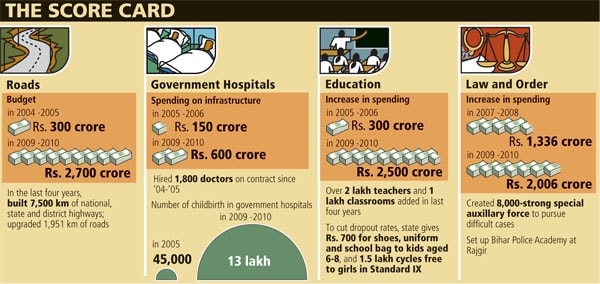
Bihar: Rising From the Shadows
CM Nitish Kumar has wrought a remarkable change in Bihar, but for the state to truly come into its own, he needs to go far beyond the quick fixes he has applied so far
Mukesh Verma, my school friend, is our host. He suggests we go for a drive around the city at 9 p.m. after he shutters his jewelry shop. “Are you mad,” I react instinctively. He assures me it’s OK. We step out. I do not mention this to my dad when he calls. He has already called thrice during the day, every time asking me to be cautious.
We go for a city tour. Cutting through the traffic in the market, we are in the Fort area. It’s quiet, the dark streets lined with thick trees, an eerie silence close to the Ganges. I am on edge. I blurt out: “Where are you going? Let’s go back.” Mukesh is cool. “We do this often. Don’t worry.” Going for a drive at night and indulging in some street food is the only way he can entertain his family in this city. And he is grateful he can do that now after so many years.
I am in Munger, my home town, after almost 15 years. This is where I went to school. This is where my dad once ran a successful business in the 1980s. About 200 km from Patna, it is a non-descript town once famous (rather infamous) for its gun factory, an ITC plant and a railway manufacturing unit.
Barely five years back, the roads wore a deserted look after dark, Mukesh recalls. Shops shut early. Girls would not step out in the evening. “Things have changed in the last three-four years. Nitish [Kumar, Bihar’s CM] has really changed things,” he says. Yet, I hesitate going alone to dinner at my teacher’s house. I avoid stepping out of the car. The gun-totting men outside a temple we are visiting make me nervous.
I admit I have a hangover.
Flashback
In the 1980s, Munger was like any backward town in India. It was normal to have 20-hour power cuts and we had mastered the art of studying by kerosene lamps. Roads were poorly maintained; garbage dumps and open drains were common. Yet, life was exciting. A big family with five girls, we were a riot. We used to go for long early morning walks in the Fort area. We had our weekly outings — movie or dinner or both. Grand-dad got us our first bicycle. We soon persuaded dad to buy us mopeds. We became famous as “moped girls” — girls there didn’t do such things then. By 1989, I would leave all this to move to Delhi for my college.
By the early 1990s, things had begun to change in Bihar. The state had a new “charismatic” chief minister in Laloo Yadav and his impact was beginning to show. Businessmen, including my dad, felt it first. My sisters needed an escort to go to the market or for tuitions. The family’s weekly outings stopped. By the mid 1990s, kidnappings, ransom, theft had all surged. In 1998, when the Centre imposed central rule in Bihar it said it has “brought to an end a rule which gave Bihar 5,000 murders, 1,000 rapes, 2,500 kidnappings and 3,000 dacoities in a year”.








